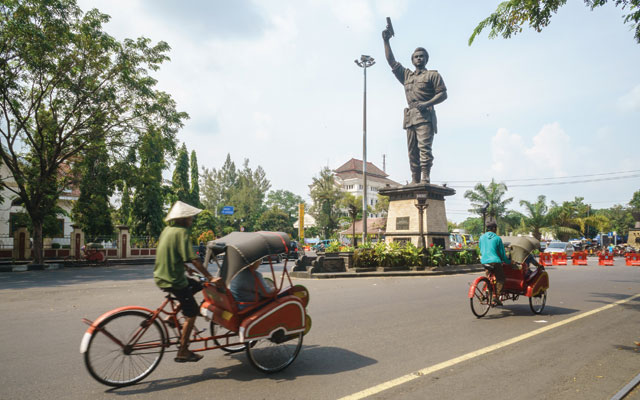Greater Solo has been quietly building up its business events capability. Now with a convention centre, it wants to be quiet no more.
A new venue that has opened in Greater Solo is inspiring confidence among local business event players who are certain that the Indonesian region will now be ready to compete on a global scale.
The venue – De Tjolomadoe Heritage and Convention – is a stand-alone multipurpose hall, and phase one of a six-part massive development by Sinergi Colomadu (see next page).

Retno Wulandari, general manager of The Sunan Hotel Solo and president of the Indonesia Marketing Association Solo Chapter, believes that De Tjolomadoe Heritage and Convention will be the bait Solo needs to attract more international business events.
“The infrastructure here is getting better, room availability is growing and we have an international airport,” added Retno.
While Greater Solo, which comprises Solo City Municipality and the Regencies of Sukoharjo, Wonogiri, Klaten, Boyolali, Sragen and Karanganyar, may not be on the radar of Asia’s business event planners, the region has been a quiet contributor to the local economy.
Greater Solo is a business region – hub to a bustling textile industry and home to Sritex, the biggest textile manufacturer in South-east Asia.
The region also boast a rich Javanese culture.
These were the elements that encouraged Indonesian president Joko Widodo – a native of Greater Solo – to transform the region into a business events destination when he was the mayor of Solo City from 2005 to 2012. He won for Solo City the International Conference of World Heritage Cities of Euro-Asia in 2008.
What followed were mega events, such as Solo Batik Carnival and Solo International Performing Arts, created to draw both visitors and positive attention to Solo City.
While these aggressive efforts tapered off when Joko left his mayor post to become the country’s ultimate leader, Greater Solo’s business events sector continued its growth.
In recent times, Solo City has been welcoming association conferences, sports events and political meetings. This year it will host an internist meeting for 4,000 delegates in July and a 7,000-pax Ministry of Youth and Sports conference in October.
Yanita Supardjan, director of sales, Alila Solo, observed: “A few years ago, corporates and associations only saw Solo City as a transit destination. Jogjakarta and Semarang were their primary choice. This has changed, with more planners (taking their events straight to) Solo.”
Daryono, chairman of the Indonesia Congress and Convention Association Greater Solo Chapter, said: “Greater Solo’s (daily financial transaction) is valued around 80 billion rupiah (US$6.2 million), the highest in Central Java and Jogjakarta region. Therefore, business events is a natural sector that we can develop.”
In comparison, Greater Solo’s leisure tourism potential is weaker – “less than 10 per cent (growth) annually” – according to data provided by the Association of the Indonesian Tours & Travel Agencies, Daryono pointed out.
For local hotels The Sunan Hotel Solo and Alila Solo, business events make up the lion’s share of business – up to 80 per cent.
Wahyu Kristiani, head of marketing for Solo City Tourism Office, believes that Solo City can prosper through creative events that highlight local culture and heritage.
“Solo City should continue to stage Solo Batik Carnival which has been around for a decade, and having a colossal dance performance featuring 5,000 dancers in celebration of World Dance Day,” she said.
This year the city will host the International Gamelan Festival, an event built around the traditional Indonesian musical instrument.
Wahyu said: “The event took place in London last year. We won the bid for Solo City this year.”
She pointed out that cultural events such as Solo Batik Carnival are helping to attract business events, and is certain that “cultural-based MICE works for the city”.
She said: “The internist meeting organiser has asked to be part of the carnival, be it participating in one of the workshops or fashion shows, or simply having the delegates try some of the costumes.”
Also leveraging the region’s rich culture to attract corporate clients are tourism specialists who have developed experiential activities.
The Sunan Hotel Solo, for instance, offers a themed dinner and tour of one of Indonesia’s oldest recording studios, Lokananta, for residential meeting groups.
Djawa Trails takes business event delegates to two royal houses of Kasunanan Surakarta and Mangkunegaram for an introduction to the history of the city.
Looking farther, Daryono said Greater Solo should work with the Jogjakarta-Solo-Semarang (JOGLOSEMAR) tourism development in marketing the bigger region as a single business events destination.
JOGLOSEMAR is one of 10 New Bali development focus areas with Borobudur Temple as an integral part. Once future infrastructure is in place, the three cities will be easily accessible, within one or two hours from one another.
The forward thinking municipal government has also established policies that are pro-business events, such as infrastructure development and investment opportunities for four- and five-star hotels.





















